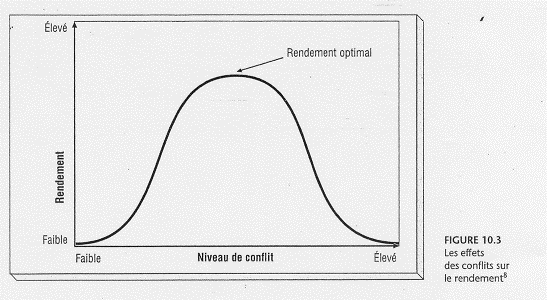Are you one of those who avoid or postpone conflict? Or those who claim that conflicts do not exist? If so, you’re not alone, about 95% of leaders are in the same situation as you. Are you familiar with constructive conflicts?
This article invites you to make peace with conflict, by presenting the benefits of constructive conflict as well as a questionnaire to diagnose your team’s openness to constructive conflict.
How can we make peace with conflict?
Conflicts can be constructive and increase your team’s performance.
High-performing teams use conflict to increase their performance
I found this graph in my university grades… (I lost the source though…)
1. Constructive conflict promotes change and adaptation of the organization.
In a conflict, established procedures, staff and task assignments, and other company policies may be called into question.
- Conflict draws attention to certain issues that can interfere with work and frustrate employees.
- Conflicts help identify potential problems that result from group procedures, tasks, and responsibilities.
- If a conflict emerges from a group, it helps to find a rule or procedure to get it right.
- It also allows a group to have the opportunity to change and obtain a better and more functional organization.
2. Constructive Conflict Increases Productivity
Conflict management helps reduce the time wasted on finding solutions that are irrelevant or could have a negative effect on productivity. By avoiding conflict, group members distance themselves and the group begins to disintegrate, which has a negative impact on productivity. This generates ideas and creates opportunities.
3. Constructive conflicts make the members of the organization more sensitive to the existence of certain problems
If there was no discussion, the team might not realize that there was a problem. Knowing that other people are frustrated and want a change creates incentives to try to solve the problem.
4. Constructive conflict promotes personal, group and organizational development.
In conflict, people become aware of what shocks them, what frustrates them, what frightens them, and discovers the workplaces they are looking for. People can become more realistic and accurate in their self-assessment. In conflict, people learn what technical and interpersonal skills they need to progress.
5. Constructive conflict strengthens interpersonal relationships and boosts group morale.
Knowing what makes your colleagues unhappy helps you understand them better. It is in conflict that managers realize how much and in what ways their management style can affect their subordinates. Project group members may realize that the good ones among them are strong enough to get them through a conflict.
Is your team able to have constructive conflict?
Teams that are not afraid of conflict…
Check what you observe, and indicate at what intensity out of 10 (10 = the sentence is true 100% of the time). Try to be as objective as possible, when in doubt, remember the last week, the last month.
- have lively and interesting meetings; ____/10
- Leverage the ideas of all team members. ____/10
- Quickly solve “real” problems. ____/10
- minimize politics; ____/10
- put critical topics on the table for discussion. ____/10
What is your biggest challenge? Share it in the comments below!
Conclusion
To discover how to increase your team’s performance and better manage conflicts (destructive conflicts or constructive conflicts), you may be interested in the Manage a Team training: online, 1h30, 18 video clips, a fifty-page learning and activity manual as well as answers to your questions for free on the training web page.






